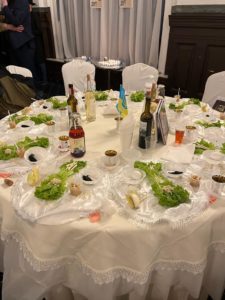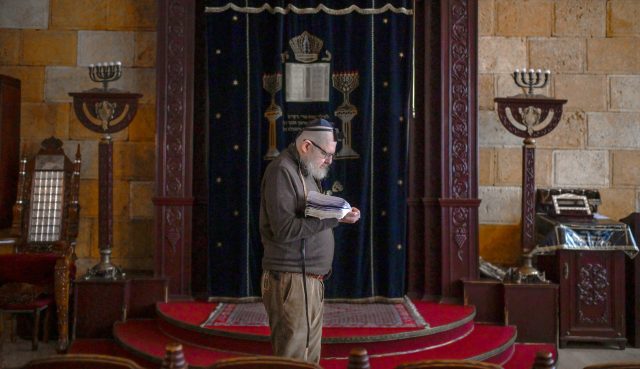A Jewish man prays in Odesa’s Chabad Synagogue (BULENT KILIC/AFP via Getty Images)

Odesa, Ukraine
The soldier leans through the car window and stares at me. He has the guileless but wary eyes of a child; he can’t be much more than 18. I’ve just crossed the border from Moldova into Ukraine and hit my first checkpoint. The soldier is slim because he is lithe and fit, but also because he hasn’t filled out yet. His chalky white face is flecked with traces of acne. He looks like he should be holding a gaming console, not an AK-47. The overall effect is of innocence hurriedly subsumed by the necessities of conflict.
On Monday evening, Ukrainian President Volodymyr Zelenskyy announced that the second — and likely far worse — phase of the war had started. Here in Odesa, the drawn-out, nasal shriek of air raid sirens is becoming more frequent. The Russians have increased their shelling of Ukraine’s major cities. The body count rises again. The city is dotted with checkpoints and sandbags, manned by twitchy soldiers. Near a central square, a tank smothered in camouflage netting sits idly waiting. Life, though, goes on. We sit in cafes, watching people walk the streets as they do their daily shop. The most obvious sign that life is not normal is the ban on selling booze after 3pm, and the 9pm curfew. Tension mingles with boredom: this is the life of a city at war.
Odesa has always had a large and culturally prominent Jewish community; today, it sits at around 30,000 people. I arrive on the first night of Passover (Pesach), the Jewish festival celebrating the story of the Jews’ escape from captivity in Egypt as told in the Book of Exodus. Very simply: through Moses, God commanded the Israelites to mark their doors with lamb’s blood so the Angel of Death would “pass over” them and kill only the firstborn of the oppressive Egyptians. Finally, the Pharaoh allowed the Israelites to leave for the promised land and off they went.
Passover lasts eight days (a week in Israel) and the first night is celebrated with a ritual feast called the Passover Seder, which tonight is being held by Rabbi Abraham Wolf of the Odesa Chabad, at the Londonskaya hotel near the seafront. Night has fallen. A local synagogue has disgorged its worshippers, who are now spilling into Pushkin Street (Ulitsa Pushkinskaya), a wide, cobbled avenue lined with large trees and a smattering of neoclassical and gothic revival buildings. I fall in with them as we approach a checkpoint of tyres and sandbags on the way to the service.
Pushkinskaya turns into Prymorskyi Blvd, and behind sandbags we can make out Odesa’s famous Potemkin Steps that dominate the entrance to the city from the sea. It’s silent and dark — many of the streetlights are turned off or dimmed to make it more difficult for the Russians to accurately bomb us — and I am surrounded by a phalanx of religious Jews dressed in black. Hebrew and Yiddish echo around me. The effect is surreal: like I’ve been momentarily transported back to the pale of settlement.
The hotel is a collection of right angles and stairs and pillars and marble; the ceiling of the lobby rises high in the air; the room is bloated with darkness. We file into a ballroom that, suitably ensconced within the building, is bathed in light. The room is filled with round tables covered with white cloth, on top of which is a Seder plate. I take my seat while Vladislav Davidzon, author of From Odessa with Love, who has travelled with me from Moldova, flits around talking to various people he knows after living here for four years. To my right sits a dark, wiry man with a scraggly black beard and twinkly expression. To my left, an older, slightly fussy but professional-looking man is examining the carpet.
It’s an orthodox service so I know it’s going to last for hours. I settle in. I first learnt the story at Hebrew school, a period of short but vast boredom that I spent alternatively sulking and gazing longingly at various girls I was too scared to talk to. Today, I have little interest in religion, but Judaism is based around ritual and story and Pesach is all about slavery and freedom, so this year it’s especially apposite. The Haggadah, the text that sets out the order of the Seder, says that “in every generation everyone is obligated to see themselves as if they themselves came out of Egypt”. It is, then, a celebration of the battle to be free.
The Rabbi speaks Russian in a thick Israeli accent. He holds up the Kiddush Cup filled with wine and says a prayer: “now, drink it in one!” he roars. The audience obliges. We never did this in North West London. I know that the food on the plate must be eaten in a particular order throughout the evening. But I’m hungry and the egg (the cycle of life) looks delicious. I surreptitiously peel it and add some salt and parsley (the initial flourishing of the Israelites in Egypt) and season with horseradish (the bitterness of slavery) before munching silently on it and swapping my plate with the one at an empty seat nearby as the Rabbi finishes a story to titters from the audience. “I think he made a dirty joke,” Vlad informs me. The Rabbi is now giving a sermon. He holds up the Matzah — the unleavened bread that Jews eat on Passover. “To break free from slavery and become free you have to eat the bread of affliction,” he says. The meaning is clear to everyone in the room.
A man in a smart blazer who has arrived late sits at the empty seat and looks at his plate, which is now missing its egg and a good portion of its greens. His eyes scan the table and fall upon the shell peelings that a waiter has moved in front of the fussy professional-looking man, who is absently playing with them. Smart blazer looks outraged, and I shoot him a look accompanied by a slight shrug. A timeless and universal gesture that says: “I know, but what can you do?” We down another glass of wine. I surreptitiously slip some Matzah to Vlad who munches on it while drinking more wine. “This is a good Seder,” he says contentedly.

I start talking to the man to my right. He’s called Michael and he’s just been to the nearby town of Mykolaiv where the fighting is fierce. Mykolaiv is what is stopping the Russian army reaching Odesa: if it falls, the Russians will be at the city gates. Michael works with the Jewish ambulance and is taking the wounded to safety. “Aren’t you worried?” I ask him. He looks upwards: “The Rebbe is with me,” he replies.
I tell him I want to go to Mykolaiv to see the front. The fussy man leans across the table. “Don’t do that,” he says. “I know you want a Pulitzer, but there is no guarantee you’ll come back.” He continues. “Look, this is not an army that respects the Geneva Convention. The Russians see the red cross of an ambulance as a target.”
We continue discussing the war. Michael tells me that he was recently laid up with Covid. “For six days I sat at home in quarantine watching Russian TV,” he tells me. “It was so good that I eventually began to believe it.” He tells me about his sister who moved to Russia when they were kids. “She called me the other week and said: ‘Don’t worry we’re coming to rescue you from those Ukrainian Nazis.’ I was in Kyiv the other week and I called her, holding out my phone to show her the damage that Russian shelling had done, and she just told me that the Ukrainians had done it themselves. Totally crazy,” he concludes with a sigh.
The Rabbi is talking again. “God has sent us something to test our resolve, to give us wisdom, to help make us become real Jews,” he is saying. “Today is very difficult, but I believe we will leave our Egypt.” Once more, the meaning is clear. The war is a test, but the Ukrainians, like the Israelites, will prevail. This is the attitude I meet everywhere in Odesa. The people are fearful, but they are hopeful, and they are proud of the way their army has fought. They are sure of their eventual triumph.
But that is only half the story. In Jewish tradition, the story of Passover in the Torah is incomplete without the commentaries of the Talmud — the books of rabbinical law and commentaries that brought nuance and analysis to the ancient pronouncements and prescriptions. Here, it is written that on seeing the Egyptians (who had decided to pursue the Israelites) now drowning in the Red Sea (after Moses had parted it), the angels were about to break into song before God made his anger known. “How dare you sing for joy when My creatures are dying?”
If the rabbi’s message tonight was clear, the God of the Talmud’s is clearer. Passover is not just a story of triumph, but of sadness. And here in Odesa, amid the joy there is darkness, too; amid what we hope is eventual victory is tragedy. This great port city, which once looked out onto the world and welcomed nationalities of all kinds, now walls itself up behind sandbags and wire. Its surrounding waters, which once brought in goods from Africa and India and Asia, are mined.
Each day, I listen to Odesans mourn their country’s dead in a war that was forced upon them by the bloodlust of a Tsar in Moscow. Ukrainians, like the Israelites, will be free. Theirs will also be a story of victory, but it will also be one laced with tragedy and sorrow.










Join the discussion
Join like minded readers that support our journalism by becoming a paid subscriber
To join the discussion in the comments, become a paid subscriber.
Join like minded readers that support our journalism, read unlimited articles and enjoy other subscriber-only benefits.
Subscribe